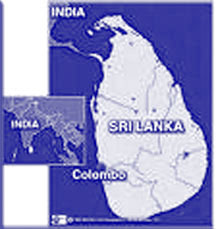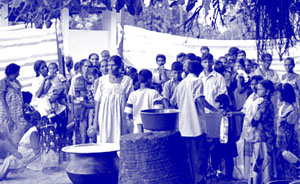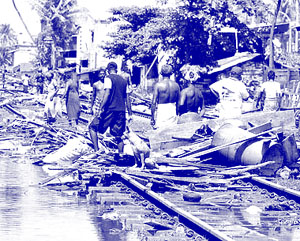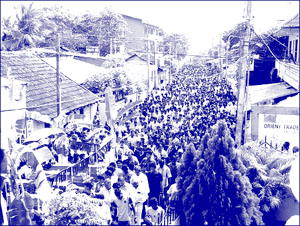|

EDITORIAL
COVER STORY
- A Precious Gift to Humanity
INTERNATIONAL SOLIDARITY
- The Other Side of the Kingdom
- Convention Now!
AFAD FEDEFAM
Together Now!
- Tying the Future with the Past
- Getting Back on Track
INTERNATIONAL LOBBY
- Still Fighting
- In Memory of the Disappeared
- The Power
of One
PHOTO ESSAY
- Protect All Persons From Enforced Disappearances
NEWS FEATURES
- Building on Nilo’s Legacy
- Filipinos Fight Against Disappearances
- Justice Suspended
- The Munir Murder
- Another Case of Impunity
STATEMENTS
/REPRINTS
- FEDEFAM Statement...
- An Open Statement to the GRP and NDFP Panels ...
- Parvez Imroz’ Award...
Asian Federation Against Involuntary Disappearances
Asian Federation Against Involuntary Disappearances
Asian Federation Against Involuntary Disappearances
Asian Federation Against Involuntary Disappearances
Asian Federation Against Involuntary Disappearances
Asian Federation Against Involuntary Disappearances
Asian Federation Against Involuntary Disappearances
Asian Federation Against Involuntary Disappearances
Asian Federation Against Involuntary Disappearances
Asian Federation Against Involuntary Disappearances
Asian Federation Against Involuntary Disappearances
Asian Federation Against Involuntary Disappearances
Asian Federation Against Involuntary Disappearances
Asian Federation Against Involuntary Disappearances
Asian Federation Against Involuntary Disappearances
Asian Federation Against Involuntary Disappearances
Asian Federation Against Involuntary Disappearances
Asian Federation Against Involuntary Disappearances
Asian Federation Against Involuntary Disappearances
Asian Federation Against Involuntary Disappearances
|
|
NEWS FEATURES: |
|
|
by Rukshan Fernando |
|
|
Justice Suspended |
|
 The
Human Rights Council made a positive stamp in history when it adopted the
Draft Convention for the Protection of All Persons from Enforced
Disappearances on 23, June 2006. It initiated a step towards truth and
justice and brought hope to the many families living in the "dark shadow
of fear." Thousands of relatives and friends of the disappeared around the
world rejoiced upon this good news.
This sense of hope, however, became short-lived in Sri
Lanka, a country where more than 60,000 people have reportedly been
"disappeared." Barely a month after the adoption of the Convention, the
National Human Rights Commission, the region’s premier statutory body
mandated to promote and protect the rights of the citizens, put on hold
the investigations on over 2000 cases of disappearances "until special
directions are received from the government."
This suspension of justice is a betrayal to thousands
of families yearning for justice and redress that have already been long
overdue. It is a backward development that must be gravely etched beside
the names of the newly appointed commissioners of the said local human
rights body.
Abandoned commitment
 In
2005, the NHRC implemented a project that had sought the inquiry into all
existing information on disappearances. The body’s Committee on
disappearances and the Presidential Commissions of Inquiry into
Disappearances worked together to study the gathered data on the reported
cases. Furthermore, it took on the load of the All Island Commission on
Disappearances, which failed to process 16,035 complaints due to
limitations in its mandate. In
2005, the NHRC implemented a project that had sought the inquiry into all
existing information on disappearances. The body’s Committee on
disappearances and the Presidential Commissions of Inquiry into
Disappearances worked together to study the gathered data on the reported
cases. Furthermore, it took on the load of the All Island Commission on
Disappearances, which failed to process 16,035 complaints due to
limitations in its mandate. 1
Later, it reduced the number of complaints to 2,000. According to Kishali
Pinto Jayawardena, a veteran human rights columnist, "it is the hearing of
these complaints that the present Commissioners had decided [for stated
and unstated reasons best known to them] to jettison.2"
Fallacious claims
According to the former manager of the said project,
the recommendation he submitted seeking more funding to sustain the
operations was rejected for the reason that "the findings will result in
payment of compensation, etc." Such statement doesn’t justify why an
independent body be dependent on government instructions.
The Committee’s claim that it is still awaiting special
directives from the government already runs contrary to the mandate it has
sworn to do: investigate by its own motion, with or without complaints
from victims and third parties, allegations of an infringement of
fundamental rights.3 It also
violated the Paris Principles4 which maintains that the NHRC should
"freely consider any questions falling within its competence, whether they
are submitted by the Government or taken up by it without referral to a
higher authority."
The Paris Principles are the standards to which the
NHRC committed itself to as a member of the Asia Pacific Forum of National
Human Rights Institution and as an accredited Commission of the
International Coordinating Committee of National Human Rights
Institutions.
It
is an extremely sorry state of affairs considering that the country’s
premier statutory body for the protection of human rights depends on the
government’s orders. This further cast doubt upon the NHRC as the
government is alleged to be the perpetrator of the cases of disappearances
it investigates.
Moreover, it is clearly stated in the Paris principle
that this institution must be "independent of the Government and not be
subject to financial control which might affect its independence."
Dependency to government funding, therefore, is not a valid reason to
offer the many victims affected by the issue of disappearances. Besides,
records showed that external donors funded its projects such as the
Internally Displaced Persons Project, Disaster Relief Monitoring Unit,
including this particular project on disappearances.
Questions are out there but no valid answers are given.
Ambiguities continue to shroud the truth.
Degraded Credibility
Consequently, the recent decisions and actions of the
NHRC have only made the worst fears of the Sri Lankan community come true
– the Chairperson and Commissioners directly appointed by the President
has pledged loyalty to the government and tossed justice out the backdoor.
Constitutional processes have been bypassed in the appointment of these
people; unconstitutional transactions have, therefore, also been made.
Doubt in its credibility has also been reflected
internationally. External funding agencies are no longer keen on funding
the Commission knowing it is headed by arbitrary officials.
Shameful truth
 Sri Lanka is one of the members of the Human Rights
Council. It is one of the countries who adopted the Convention and
promised to protect the people from disappearances. It is a shame then
that its government failed to live up to its commitments. Acts of enforced
disappearance has resumed in the North. Where is the NHRC at this time
when the country needs it? Whose rights does it need to protect? Where do
the rights and dignities of the people lie in their priorities? Where is
the integrity now in carrying out the duties they have sworn before their
countrymen and for the citizens? Sri Lanka is one of the members of the Human Rights
Council. It is one of the countries who adopted the Convention and
promised to protect the people from disappearances. It is a shame then
that its government failed to live up to its commitments. Acts of enforced
disappearance has resumed in the North. Where is the NHRC at this time
when the country needs it? Whose rights does it need to protect? Where do
the rights and dignities of the people lie in their priorities? Where is
the integrity now in carrying out the duties they have sworn before their
countrymen and for the citizens?
Endless wait
When will justice come? Till when do families need to
wait?
 According
to the former manager of the disappearance project, many complainants are
already old, feeble and in dire circumstances, yet justice remains
elusive. Impunity continues to run amok. Families cannot find closure in
their lives. Traumas repeat themselves in the subconscious hampering the
daily functions of the victims. Relatives of the disappeared suffering
from poor economic conditions cannot claim inheritance as cases have not
been heard and disappearances have not been confirmed. According
to the former manager of the disappearance project, many complainants are
already old, feeble and in dire circumstances, yet justice remains
elusive. Impunity continues to run amok. Families cannot find closure in
their lives. Traumas repeat themselves in the subconscious hampering the
daily functions of the victims. Relatives of the disappeared suffering
from poor economic conditions cannot claim inheritance as cases have not
been heard and disappearances have not been confirmed. 5
The UN High Commissioner for Human Rights and her
office, particularly the National Human Rights Institution must intervene
soon and call for the resumption of the cases’ processing. The
International Coordination Committee and the Asia Pacific Forum of
National Human Rights Institutions must also seriously consider the
accreditation and membership of the Sri Lankan NHRC. Most importantly,
civil society – in Sri Lanka and outside – must rise up against this
blatant act of injustice towards the families of the disappeared and
ensure that justice soon prevails.
So long as justice is left hanging, so are the lives of
the victims.
(Footnotes)
1 Official webpage of the Sri Lankan Human Rights Commission-http://www.hrcsl.org/projects/database/database.php
2 Kishali Pinto Jayawardena – Focus on Rights – The Sunday Times, July
23, 2006
3 Based on Art.14, Parliament Act 21 of 1996. Establishing the National
Human Rights Commission, http://www.hrcsl.org/about/act/HRActenglish.pdf
4 Principles related to the status of national institutions, http://www.nhri.net/pdf/ParisPrinciples.english.pdf
5 Namini Wijedasa, "Un-inquired disappearances will hamper victims’
families, Sunday Island, 23 July 2006.
|
|
Rukshan Fernando is Sri Lankan by nationality.
He works as head of the Human Rights Defenders’ Program for Forum Asia. |
|
The
Voice |
Vol. VI No.1 November 2006
|
|